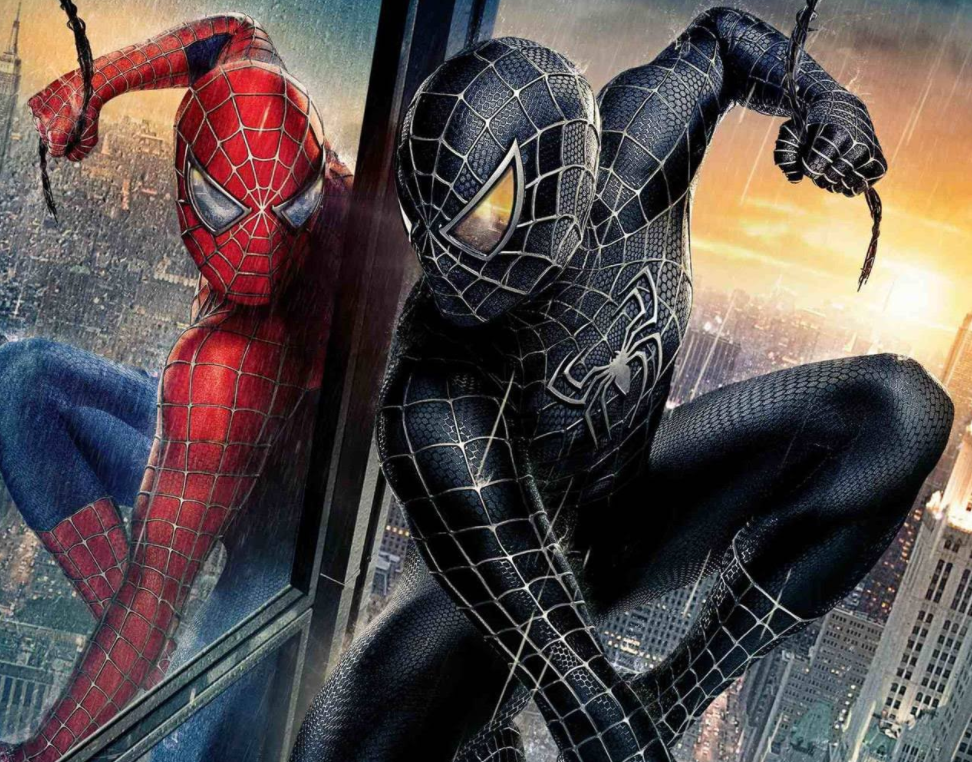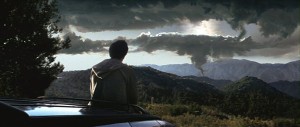On 10th Anniversary, ‘Now Playing’ Hosts Talk Milestones, Memorable Moments
Let’s jump back in time 10 years to summer 2007. Sam Raimi had just tanked the Spider-Man franchise, the Fast & Furious films had stalled with Tokyo Drift, and nobody knew if George Lucas would ever launch another Star Wars trilogy.
This was when Now Playing Podcast first went on the air. Back when we still believed Crystal Skull might be good and before they rebooted Freddy’s origin story to make it, just, icky.
Not only does 2017 mark Now Playing’s 10th anniversary, the upcoming War for the Planet of the Apes review marks its 700th episode. That’s a lot of movies (and also the occasional failed TV pilot or one of those superhero shows that played theatrically in Bulgaria or wherever).
To mark the occasion, the show’s hosts came together for a Q&A about their time behind the mics and what’s changed during the last 10 years.
Venganza Media Gazette: What do you remember thinking after you heard your voice for the first time on Now Playing?
Arnie: “Well our first episode was recorded in a car in the parking lot of a Toys r Us. So my thought was, ‘For being in a car that doesn’t sound TOO bad.’”
Marjorie: “I was used to hearing my voice on Star Wars Action News but I still thought I sounded under 13. And then you have the thoughts such as ‘I really sound like that?’ or ‘What if people find my voice irritating?’”
Stuart: “I like to be behind the scenes — directing, writing, evaluating other people’s art. It was pretty painful to step in front of a mic and even more awkward listening to myself on some of my early shows. I was grateful that there weren’t too many listeners back in 2008 and early 2009.”
Jakob: “I was no stranger to hearing my voice; I had sang in bands and had been podcasting on and off for a few years prior. But at the time a huge part of our listenership were horror fans, a genre I wasn’t very familiar with. So there was some anxiety with having my introduction with the SAW movies and having to speak about a genre I just didn’t have a lot of exposure to.”
Venganza Gazette: What’s changed about you as a host?
Jakob: “I watch a lot more movies and I discuss them a lot more — not just with my co-hosts, but with my family. We spend a lot of time discussing why a film does or doesn’t work.”
Marjorie: “I have a different view of movies now. I see so much more that goes into a movie. More than just ‘it was good.’ I also can’t ever ‘turn off’ reviewing. When I see movies I’m not reviewing, I tend to dissect them.”
Jakob: “My wife and I share what we consider great scenes with our girls, even if they may be too young for the entire movie. Is it crossing a line that we reenacted the ‘I drink your milkshake’ scene from THERE WILL BE BLOOD for our 10 and 6-year-old?”
Stuart: ”The biggest change for me is the zip code where I record. I’m no longer ‘Stuart In L.A.’ When I started Now Playing I always worried that things I said might come back to haunt me working in the Los Angeles entertainment industry. Now that I’ve stepped away from that scene, I sleep better at night.”
Arnie: “The differences are greater than the similarities, in my mind. What’s the same? A rotating cast of hosts and we devote one episode to one movie. What’s different? Everything else. Now Playing started as a show where we would record short, spoiler-free movie reviews.”
Stuart: “A long show in 2007 was 30 minutes. Now we go twice as long on an episode of Twin Peaks.”
Arnie: “They weren’t going to be edited at all, as editing takes five-to-10 times the length of a given show.”
Brock: “I do remember editing the first show I did with my wife – back then it was a two person review show, much like what Arnie and Marjorie do on Star Wars Action News.”
Arnie: “As I had Star Wars Action News already I didn’t feel I had the time to undertake more editing. So they would be instant reaction thoughts, recorded immediately upon leaving the theater, and published as-is [with] minimal editing, [and] we also were going to focus on new releases only. Now we go through the history of film, with spoiler-filled critiques that are very long, and very well edited by a great team including Heath and David.”
Jakob: “We just go so much more in depth now. But for me, personally, I approach the show with a different attitude. When I first came on, I had a MST3K mentality. I mean, I had to review a bunch of SAW films — not really my thing — so I thought, ‘How many jokes can I make?’ Now, while we still shoot for humor at times, I try focus on the filmmaking and storytelling so I can articulate how those contribute to a film, good or bad.”
Brock: “Today we are a well-oiled machine, even more comfortable sharing our opinions and talking with one another. The shows back then, and especially when we started the roundtable format, had the best we could do technically at the time, and now the production values are insanely great thanks to our equipment, sure, but mostly because of the countless hours Arnie puts in producing each and every episode. And also the incredible, tireless work of our talented editors who make us all sound so good.”
Marjorie: “We are all so much older and wiser! I think that we all found our rhythm with each other. I have a natural rapport with Arnie because we are married and therefore spend a lot of time together. But Stuart, Jakob and myself had to build that.”
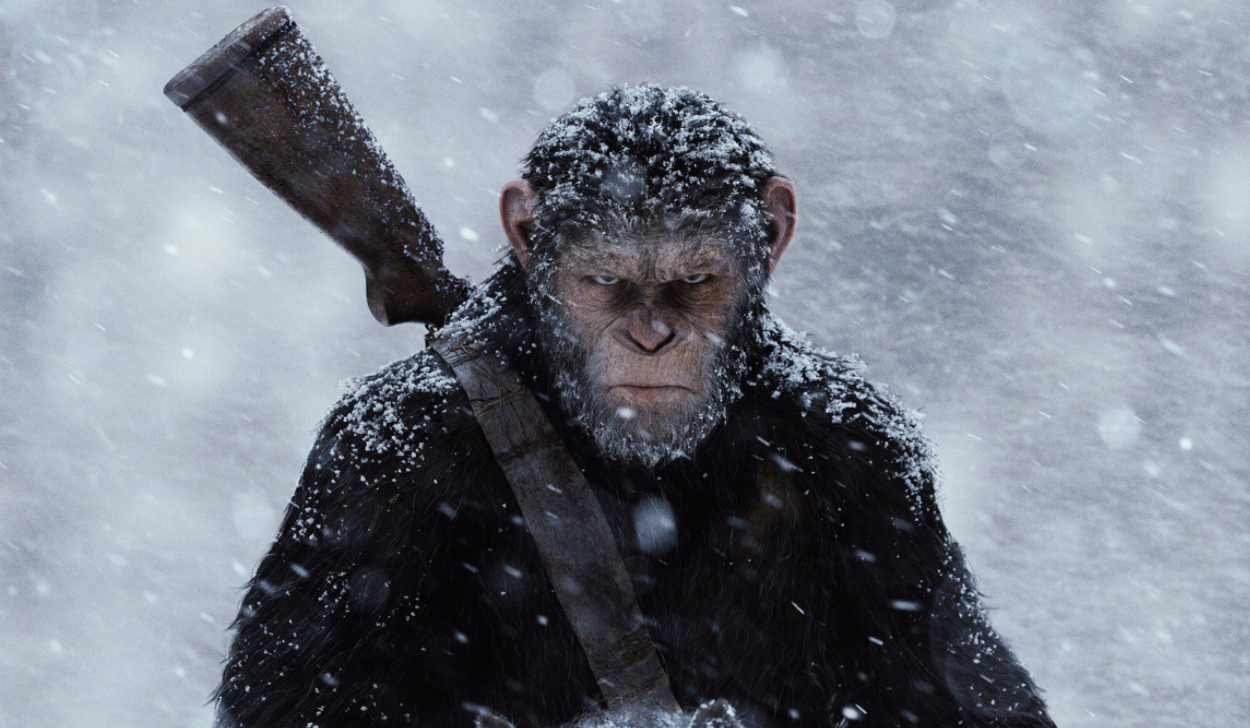
The July 14, 2017 War for the Planet of the Apes review marks Now Playing Podcast’s 700th episode.
In addition to hitting the 700th episode milestone, several of the hosts are racking up big numbers behind the microphone. When the War for the Planet of the Apes review is released, Arnie will have hosted 676 Now Playing episodes, Stuart will have hosted 618, and Jakob will have hosted his 469th show.
Venganza Gazette: Do you have a favorite Now Playing episode?
Stuart: “INCEPTION was an early favorite of mine because I think it was such a turning point for the show. Now Playing proved in that podcast that we could do more than heckle. On top of really liking the movie, I was proud of the way we broke down all of Nolan’s multi-level storylines and daunting thematic readings in a very concise 73 minutes.”
Arnie: “I really am proud of PROMETHEUS. That was a film with disparate, and surprising, opinions from the hosts, and yet the conversation was always lively, and I think everyone made such great points. I re-listened to that show recently because of ALIEN: COVENANT and so it’s recent to my memory, but even before that it was a go-to for me to see three of the hosts bringing their A-game.”
Brock: “I really liked what the guys did with RAIDERS OF THE LOST ARK. Sometimes with a really good movie, a classic, practically flawless movie the show can be a little harder for us panelists to do. You can’t tear it apart, and there aren’t always opportunities to make jokes because the jokes have been made for 30 years already. Everyone is so familiar with the movie itself and the behind the scenes information already and on top of that the listeners know going in it that the hosts are all going to give it a green arrow. The team embraced all these challenges and showed us why Now Playing is as good as it gets with review shows. The guys did a great job with the commentary, the trivia, and played off one another beautifully making an entertaining show that was structurally and technically proficient. So much so that I have enjoyed listening to that show multiple times over. A highlight for me is when Stuart brought up the CASABLANCA correlation; not many people get that aspect of RAIDERS and I’m glad he did and shared it with the audience.”
Jakob: “I’m really enjoying our current Now Peaking discussions for TWIN PEAKS: THE RETURN. What’s fascinating is we had the chance to do a whole David Lynch retrospective building up to this new series. With Lynch, as an auteur, there is so much of him in this return to Twin Peaks. It feels like a culmination of his entire aesthetic and viewpoint. Within the first two episodes we had brought up the influences of ERASERHEAD, BLUE VELVET, LOST HIGHWAY, MULHOLLAND DRIVE, and INLAND EMPIRE. I’m still not sold on this third season, but it has been insightful to discuss it in the context of Lynch’s complete works and not just the original run of the television show.”
Venganza Gazette: What’s the most positive feedback you’ve ever received from a listener?
Arnie: “I can’t begin to express how touched I am by some listeners’ messages to us. From troops stationed overseas who use our show to experience movies they can’t yet see to adults who say our show is like a conversation with friends, each message means so much.”
Marjorie: “There have been a few people who have written to us about how listening to Now Playing got them through a rough patch in their life. And I think it’s utterly amazing that, even remotely, I was able to help someone.”
Stuart: “I never thought three people riffing on movies had the potential to heal, but I have been incredibly moved by all the stories fans have shared over the years about how we helped them laugh away depression, death, and some real big life challenges.”
Arnie: “A handful of people have e-mailed with a very specific message and I’m humbled every time I read them. These are people who have been in bad situations: illness or accident, divorce, job loss, the death of someone close to them, or sometimes a combination of those. These are people who tell us they felt hopeless. One person said, ‘I felt like I would never be able to laugh again.’ A couple people mentioned contemplating suicide. These are deeply personal moments being shared via e-mail with us. Then their notes change tone and discuss how our show helped them through. We entertained them, in that one case we gave him the first laugh he’d had. We took their minds off their troubles and brought them a bit of happiness. That is my dream come true — to be able to entertain people and give them a few moments where they aren’t thinking about their day, their responsibilities, and their problems.”
Stuart: “I never expected to have such impact on anyone, and I’m incredibly humbled by that.”
Arnie: “It took me a while to figure out what I wanted to do with my life. I considered being a lawyer or a stockbroker. But in high school I realized the importance of entertainment in my life. I had my own dark days in my teen and early adult years. What got me through those times were video games, movies, television, books – entertainment. So starting in high school, and really for the rest of my life, my goal has been to entertain. I wanted to give people that escape the way Gene Roddenberry, George Lucas, Will Wright, and Stephen King helped me to escape. My path to finding podcasting as that vehicle was a winding one, but it was the outlet I found. And I can’t express how touched I am when I read what we do does provide that for some of our listeners. It fills me with purpose, and reminds me that we’re not just discussing the eighth in a bad series of direct-to-video sequels, we’re hopefully also entertaining and informing at the same time.”
Venganza Gazette: What’s the strangest feedback you’ve ever received from a listener?
Brock: “I was at a Comic Con, talking to the vendor on the other side of the table about an action figure or something, and this guy standing next to me exclaimed ‘Hey, you’re Brock! I recognize your voice!’ That was pretty cool to be picked out by my voice alone.”
Marjorie: “I had some weird messages from guys who liked my voice.”
Stuart: “It was pointed out very bluntly a few times on Facebook that I have a ‘squeaky voice’ when I get excited. Hey, I’m not going to say that’s untrue, but there’s only so much I can do about that until I finish going through puberty. How I wish I could hire Barry White to say all the things I’ve got to say!”
Brock: “There was this one [comment] we received years ago that accused me of trying to sound professional, putting on a radio voice when I talk or something. Arnie told Stuart and I about this thing one night when we were recording, and we all got a great laugh because this is how I talk! I wouldn’t have the patience or the discipline to put on a fake voice for hours on end, each and every time we do a recording session. I mean, I guess that is sort of a compliment, that my voice sounds that way, but the guy clearly didn’t have a clue about what he was talking about.”
Jakob: “One listener offered to pay for my dental work after he punched my teeth out because of my views on one film. I wonder if the police I had to involve became fans of Now Playing after I reported [him]?”
Arnie: “I need to be vague about this for privacy, but a listener wrote in and told me how, in 2012, he had a workplace encounter with Bradley Cooper [and] he ended up turning Cooper on to Now Playing, specifically our HOWARD THE DUCK show. The next day Cooper told him he laughed his ass off listening to that podcast. He said he downloaded some other shows, including our ROCKY reviews. That is totally surreal to think of the voice actor who performed in GUARDIANS has listened to our HOWARD THE DUCK review.”
Stuart: “We get a lot of positive feedback when we slam a problematic movie like HOWARD THE DUCK or HALLOWEEN III.”
Venganza Gazette: What’s the one film you’re still waiting to review?
Jakob: I’d love the work through Paul Thomas Anderson’s THE MASTER. It’s a film that I’ve done a complete 180° on since its theatrical release. Originally, I recognized the amazing acting but the story left me cold. I recently re-watched it with my wife, who is a huge Phillip Seymour Hoffman fan. As we worked our way through the film, she helped me realize what a heartbreaking romance it is in the midst of some heavy ideas about religion and post-war America. I would love to discuss such a dense piece of work.”
Stuart: “THE MANITOU! There is no crazier horror movie from the 1970s. It would be a perfect Easter Egg pairing with THE OMEN and ROSEMARY’S BABY franchises.”
Marjorie: “I would love to do a 70s disaster movie retrospective. There was a small heyday of disaster movies.”
Arnie: “DONNIE DARKO is a favorite film of mine that I think is so rich for analysis, even if the director did make it so obvious with various supplements and the director’s cut.
Brock: “BUTCH CASSIDY AND THE SUNDANCE KID. It’s my favorite movie, and the first movie I say when people ask me for a film recommendation. Every time. Not enough people watch it anymore but they really should. It’s not a traditional western, but can be a hard sell to people who deeply dislike westerns. Perhaps we can bundle it THE STING and that sequel they made in 1979 with Tom Berenger. I have avoided watching that sequel but I’d watch it for Now Playing.”
Arnie: “I made a vow to never watch S DARKO, the cash-grab DONNIE sequel with hardly anyone from the original involved. If we reviewed DONNIE I’d probably have to watch S, and I really don’t want to taint my love of the original with a super-shitty sequel.”
Now Playing Podcast will release its War for the Planet of the Apes episode as part of its 2017 Spring Donation Drive. Supporters of the show can hear the review, along with all of the episodes in the Planet of the Apes series, at NowPlayingPodcast.com.
July 10, 2017 Posted by Jason Latham | Now Playing Podcast, Podcasts | Alien: Covenant, Arnie Carvalho, brock, Butch Cassidy and the Sundance Kid, David Lynch, Donnie Darko, Eraserhead, inception, Inland Empire, jakob brewster, Lost Highway, marjorie carvalho, Mullholland Drive, Now Playing Podcast, Podcasting, prometheus, Raiders of the Lost Ark, Saw, Spider-Man 3, Star Wars Action News, stuart atkinson, twin peaks, war for the planet of the apes | 9 Comments
The 40 Year-Old-Critic: Donnie Darko (2001)
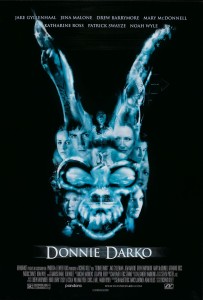 In The 40-Year-Old Critic, Venganza Media creator and host Arnie Carvalho recalls a memorable film for each year of his life. This series appears daily on the Venganza Media Gazette.
In The 40-Year-Old Critic, Venganza Media creator and host Arnie Carvalho recalls a memorable film for each year of his life. This series appears daily on the Venganza Media Gazette.
“You have to watch this movie!” Marjorie exclaimed.
I had just returned home from a very late night at work. I was exhausted and had no idea what she was talking about.
“Donnie Darko. You have to see it,” she told me. “It was on TV tonight. It’s great, but I have no idea what the hell it’s about.”
That, in 2003, was my introduction to Richard Kelly’s directorial debut, Donnie Darko.
I had heard about Donnie, but only in passing. I never knew of its release in 2001; a movie that featured a plane engine crashing into a house was a tough sell just a few weeks after the September 11 attacks on New York City.
The film did catch my eye the following year after it was released on DVD. The title repeatedly popped up at Bloody-Disgusting.com, one of my favorite horror movie websites. Wedged between news articles about Jason X and Bubba Ho-Tep, films for which I had built-in interest, it took several mentions of Darko for me to click the links and read the articles. When I finally did I was confused and slightly put off by the descriptions of a man in a giant bunny suit — I envisioned very low budget, low rent horror from a film with a ghostly bunny.
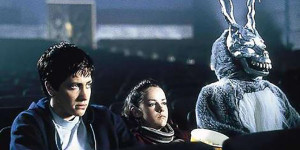
Three’s a crowd when Frank the Bunny comes on your date.
Marjorie’s enthusiasm that night and the online buzz I continued to read convinced me to rent the DVD immediately. I expected straight-up horror, perhaps with a guy in a rabbit suit killing random people.
That was not what I got. Not by a long shot.
First, I wasn’t sure why a website devoted to slasher and horror features spent so much time covering Donnie Darko, which I view as a dramatic sci-fi film. The story invokes concepts of time travel, parallel universes, and psychic phenomena; all delivered in an oblique, theoretical fashion.
When credits rolled I shared my wife’s enthusiastic reaction, but I understood it no better than she did. We talked for hours that night, debating the possible meanings of what we just saw.
What I knew, I knew for a solid fact, was that Donnie Darko was a period-piece teen film. Set in 1988 the story revolves around troubled teen Donnie Darko (Jake Gyllenhaal). On the surface his life looked perfect; he lived in a big house in Virginia, his parents were still together, his older sister was about to enroll in Harvard, and his younger sister was part of the successful dance troupe Sparkle Motion. Yet Donnie is a misfit, full of angst and despair, fighting with all of his family members. He also has weekly therapy sessions where he discusses his sexual fantasies and his fear of being alone.
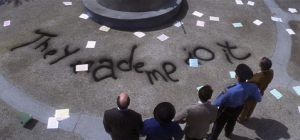
…but who are “they”?
Donnie is smart, his test scores are described as “intimidating”, but at school he has only a small group of friends that discuss nothing more important than the sexual preferences of Smurfs. Early in the film Donnie starts dating the new girl in school, Gretchen Ross (Jena Malone), his first real connection with anyone.
There are some teachers with whom Donnie gets along very well, including science teacher Dr. Monnitoff (Noah Wyle) and English Literature teacher Miss Pomeroy (Drew Barrymore, who also served as executive producer). Both are younger and freer to have open dialogue with their students.
Then there is older health teacher Mrs. Farmer (Beth Grant), an activist who rails against Pomeroy’s teaching of Graham Greene’s short story “The Destructors.” Farmer pushes the school to teach morality based upon the works of motivational speaker Jim Cunningham (Patrick Swayze), who believes everything in life is a choice between love and fear.
Donnie rails against this reductive philosophy, increasing his parents’ view of him as a troubled child.
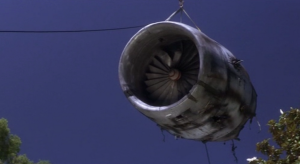
Deus ex machina…a literal God machine.
Taken just as the above, this movie feels like a throwback to classic John Hughes teen fare like The Breakfast Club or Pretty In Pink. It’s the standard tale of a high school student on the precipice of adulthood struggling for free thought in an environment that doesn’t foster such expression. The period-piece setting augments this feeling; the Bush/Dukakis election is referenced, Donnie’s mother reads Stephen King’s It, and the soundtrack features music by Tears for Fears and Duran Duran. There is a large aspect of Donnie Darko that plays just like one of those teen films, and could be taken as such.
But then there’s the jet engine, and Frank the Bunny.
Donnie is a sleepwalker; in the first scene in the film we find him waking up on a hill and riding his bike home. He appears to have been crying.
The next night he is called from his bed by a strange voice. Following it, he finds a man in a strange, dirty rabbit costume, wearing a twisted, frightening, metal bunny mask. This man is Frank, and he tells Donnie that the world will end in 28 days, six hours, 42 minutes, and 12 seconds. We’re not sure if Frank is real or a vision, but it saved Donnie’s life, as that was the night a jet engine crashed into the boy’s bedroom. Had Donnie been there he’d have been killed.
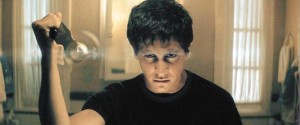
He has a knife in the bathroom. Is Donnie going Psycho?
Every time the film starts to settle into a predictable teen movie routine, something strange happens; Frank appears and gives Donnie destructive orders such as to flood the school or to burn down Cunningham’s house.
Donnie follows the orders, but the audience is left wondering what’s truly happening. Is Donnie a bad kid? Is he having a psychotic break? Is Frank a manifestation of Donnie’s insanity? If the latter is true, then what is with all the talk of time travel and parallel dimensions?
More, each of these bad acts lead to good ends. Flooding the school causes class to be cancelled, and in that free time Donnie first asks out Gretchen. Then, in the ashes of Cunningham’s home, a dungeon full of child pornography is discovered. It’s implied that Swayze’s character may be the head of a kiddie porn distribution ring, and Donnie’s arson helped put an end to it.
Slowly, Donnie becomes convinced that Frank is from the future and that Donnie himself can see future events. He discusses this with Dr. Monnitoff and is given a book, The Philosophy of Time Travel, which precisely details the strange things occurring in Donnie’s life.
Is this the case? Is Donnie insane? Is this all a dream in the character’s head? Is Donnie a stand-in for Jesus?
Simply put, the movie was a mind-fuck. When credits rolled I had no idea what I’d seen, but I knew I enjoyed it.
On Now Playing Podcast I’m often referred to as the critic who places the most importance on story, so it may be unexpected that many of my favorite movies are ones with incomprehensible plots. But I’ve also made it clear on the show that I often love to discuss films more than I love the films themselves. To me, the best movies are conversation starters — films that, as mentioned in True Romance, after watching you can go talk about over a slice of pie.
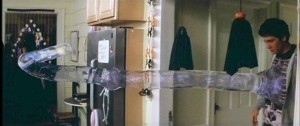
Is this telling Donnie where he will go, or determining his path? If Donnie hadn’t seen this vision would he still have walked this way?
The films need to have a hook; I don’t enjoy every overly dense, incomprehensible, artsy films. There must be some semblance of story, even if the story is not entirely clear. The film also needs relatable characters and circumstances. Having an awesome soundtrack or score, a fun vibe, helps as well.
More often than not this type of film just pisses me off and I never think of it again. But on the rare occasion, when the aforementioned elements come together, the result can be magic. Some other films that embody this include David Lynch’s Lost Highway, Oliver Stone’s Natural Born Killers, and Adrian Lyne’s Jacob’s Ladder. These are movies that stick with me long after the credits roll.
One key to make this type of film come together is the cast. Talented actors, especially familiar faces, can help me feel comfortable when undertaking a strange journey.
I only knew Gyllenhaal as the lead character in the horrible 2001 “comedy” Bubble Boy, and I wrote him off as someone who would never work again. After seeing Donnie Darko, his second lead role, I knew this was an actor with talent and range. This entire film rides on Gyllenhaal’s performance; the character is not only the focus of almost every scene, he’s also going to do illegal and destructive acts. Gyllenhaal gives Donnie a sweetness and vulnerability that makes him sympathetic and genuine. He may be dangerous, to himself or to others, but we want to see him happy.
While I barely knew Gyllenhaal, I was very familiar with his impressive supporting cast. When reading about the film’s low budget, I never expected to see actors I recognized. Yet this cast is full of them. Swayze’s inclusion really helped with the late 80’s vibe, as he was a star at that time with Red Dawn and Dirty Dancing. Mary McDonnell had two Oscar nominations in the 1990s, and soon after Donnie Darko she would rise to prominence again in the rebooted Battlestar Galactica series.
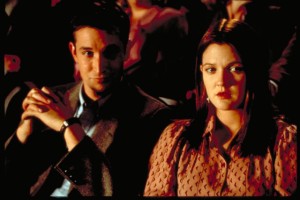
An impressive roster of known stars take bit parts in Donnie Darko.
While those supporting actors were having a lull in their careers at the time Darko was filmed, two stars were at their zenith. Noah Wyle was an actor hot on TV’s ER, and Drew Barrymore was riding high off her career resurgence in Scream.
Credit for this cast, and the film’s own creation, must be given more to Barrymore than Kelly. After Scream, Barrymore had begun a successful producing career with back-to-back hits Never Been Kissed and Charlie’s Angels. Kelly had no luck getting his film produced until Barrymore took on the project, and her involvement helped raise the $4.5 million budget and draw named talent to the project.
All of these elements combined to create an enjoyable movie viewing experience. But what was it about? I felt like I almost got it on my first viewing. Hours of reflection with Marjorie made us each realize a point, a line, which the other had missed.
We watched the film again the very next day, and I got a little more. My impression upon second viewing was that Donnie, a depressed and lonely boy, got to experience one month of happiness and reconnect with his family before he was destined to travel through time and die. I believe it was his destiny to die, but, thanks to unexpected time travel, his death is less tragic than it might have been.
I then spent the entire following day on the computer visiting the Donnie Darko website (no longer online but partially available via archive). Following the example set two years earlier by The Blair Witch Project; the Donnie Darko site was completely in-universe. I could read police reports about Donnie’s 1986 arrest for arson (briefly mentioned in the film), or the newspaper article about pedophile Cunningham’s suicide in the days after the film ends.
The site itself was as dense as the picture, with no obvious navigation. Animations played out on the screen and strange phrases appeared. As a gamer and web designer, the site sucked me in as much as the movie. It was designed perfectly from a psychological standpoint — I would click enough obscure links to get just a drip of information. Like a rat awaiting a treat I repeatedly pushed buttons. I sat at that computer all day, and I remember it well. I didn’t eat, I didn’t move, I just looked for more and more meaning.
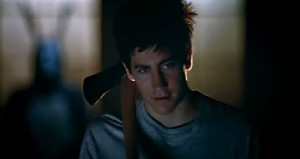
Donnie getting ready for school…
The site was filled with excerpts from the fictional book The Philosophy of Time Travel, written years ago by an old lady Donnie and his friends call “Grandma Death” (Patience Cleveland). The text talked about tangent universes, living receivers, the manipulated living, the manipulated dead, ensurance traps, and more dense terms. No, the site wasn’t here to give me clear answers, but it did aid in my interpretation.
Obsessed, I watched the movie again and this time I thought I had it. I could map the information in the site to the characters on screen. I had an explanation. I didn’t waver from my thought about Donnie experiencing happiness in his final days, but I did start to understand a little more about the mechanics of time travel in this movie, and how Frank the Bunny came to be.
Some may be right to say that films shouldn’t require hours of research to understand. To that I say it wasn’t required, it was desired. The film hooked me enough that I wanted to know more; I had my theories but for me it’s often more interesting to know the director’s vision and intent. Sometimes the intent is ambiguity, but other times they have many ideas but one “truth.”
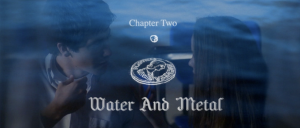
This is not a DVD menu or bonus feature. In the Donnie Darko director’s cut text is put on the screen to try and explain the film to the audience.
Finally, in 2004 I had the chance I missed in 2001 — to see Donnie Darko in theaters. Marjorie and I both drove to Chicago to see the limited release, joined by my Now Playing co-host Stuart, who had not yet seen the film.
The movie had been heavily edited between its Sundance premiere and its wide release. The director’s cut restored 20 minutes of footage, but made even more changes. In what I’m guessing was an attempt to be more accessible for mainstream audiences, Kelly added text to the screen — text taken straight from the Donnie Darko website.
There were other changes, including dialogue and music, but I felt adding the text was going a bit too far. In an effort to be less dense the director had created a weird movie experience that was akin to looking at an appendix while watching. I was happy with some of the scenes put back in the film, ecstatic to see it on the big screen, but in the end I prefer the original cut without the text. I liked the mental challenge of trying to piece this movie together on my own (Similarly, Lost Highway lost some of its appeal when the director went on record stating that film’s “truth”).
Having said that, I’m not certain that even with the text Donnie Darko is so clear-cut. For this review I re-watched the film for the first time in several years. I am a different person in 2014 than I was in 2012; as this review series indicates, I’m becoming more reflective about issues of life and mortality. In this viewing I saw a totally new interpretation of Donnie Darko, one that does involve time travel but also fate, destiny, and the will of God. When I took this as solely a sci-fi drama I missed the spiritual themes that permeate the movie.
In my original thesis, I believed that Donnie needed to connect and feel happiness before his death. But now I see the subtext about “God’s channel” — that Donnie had free will, he didn’t have to die, but to do so was to deny God. Donnie was having an existential crisis; his loneliness came in part because he didn’t want to die and he found no way to believe in anything more than this world. Through the experiences of this movie Donnie not only realizes his role is to die, but he knows it’s his choice to die. He could deny his fate, but in doing so he would deny God’s will. If God has will then there must be a God, and so, reassured and finally finding proof in divinity, Donnie laughs as he takes that next step into the afterlife.
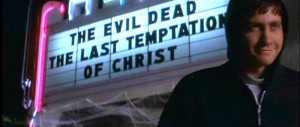
The viewer gets to pick which movie they see through various interpretations of Donnie Darko.
Yet, the more I ruminate on this movie, I would not say my interpretation is the only one. While I think it is what Kelly was going for, so many other interpretations are possible. I would be hard pressed to argue against a reading that Donnie is schizophrenic and having a psychotic episode, as his psychiatrist suggests. I read a theory online that Frank is like The Ghost of Christmas Future and no time travel actually happens, Frank just shows Donnie a vision of what could be. You could say this film is just a take on the theme of the Final Destination films — Donnie was supposed to die and, since he didn’t, Death surrounds him.
The alternate theory, though, that I think Kelly teases most is that there is no such thing as time travel, and this entire move is Donnie’s dream in the moments before his death, in the spirit of An Occurrence at Owl Creek Bridge. This is very clearly given as an option when Donnie and Gretchen go to a two-screen movie house. Do they choose The Evil Dead or The Last Temptation of Christ (which depicts such a dream-in-the-moment-before-death scenario)?
The film’s very final scenes, though, seem to indicate that others in town have a lingering memory, like an almost-forgotten dream in the night, of what Donnie experienced. That realization, that something happened to people other than Donnie, always returns me to my original theory: Donnie had to die, but he got to die after experiencing joy.
Even with this seemingly uplifting message, the movie is horribly sad. I well up every time during the film’s denouement. It’s set to a slow, somber cover of Tears for Fears’ “Mad World” sung by Gary Jules. I had never given that song’s bubble-gum pop lyrics much thought, but this version, mournful and soft, gave the words meaning I’d never considered. It’s the rare cover that makes all earlier versions of the song obsolete (though never, ever listen to the second version on the soundtrack where they added drums and other instrumentation. It is virtually ruinous to the perfect, minimalist recording).
A sequel to this film was released, S. Darko, telling an equally strange and surreal story about Donnie’s younger sister Samantha (Daveigh Chase). That film may contain more answers, but I refuse to see it. It was a studio made product with original creator Kelly having absolutely no involvement, insight, or approval. The director even took to social media to clarify that this was done without him. As such, I will never, ever watch this sequel, for my fear is that S. Darko won’t merely be terrible but, like the previously mentioned remix of “Mad World,” it will permeate my thoughts when I return to the original and ruin my enjoyment.
Donnie Darko changes every time I see it, or perhaps I change every time it sees me. It’s a film that has long moments of Donnie looking into a mirror, and perhaps that’s what I’m doing. In a film this impenetrable it’s easy to project your own thoughts and desires. What I do know is this is an absolute masterpiece of a film that everyone should watch.
When you do, share with me your theories. I’d love to hear them.
Tomorrow — 2002!
Arnie is a movie critic for Now Playing Podcast, a book reviewer for the Books & Nachos podcast, and co-host of the collecting podcasts Star Wars Action News and Marvelicious Toys. You can follow him on Twitter @thearniec
August 31, 2014 Posted by Arnie C | 40-Year-Old Critic, Movies, Now Playing Podcast, Podcasts, Reviews | 1980s, 2000s, 40-Year-Old Critic, Donnie Darko, Enertainment, Film, Mad World, Movie, Movies, Now Playing, Now Playing Podcast, Podcasts, Review, Reviews | 2 Comments
-
Archives
- February 2021 (1)
- January 2021 (1)
- December 2020 (1)
- November 2020 (3)
- October 2020 (2)
- September 2020 (1)
- August 2020 (2)
- July 2020 (1)
- June 2020 (1)
- May 2020 (1)
- April 2020 (3)
- March 2020 (2)
-
Categories
-
RSS
Entries RSS
Comments RSS
Site info
Venganza Media GazetteTheme: Andreas04 by Andreas Viklund. Get a free blog at WordPress.com.
